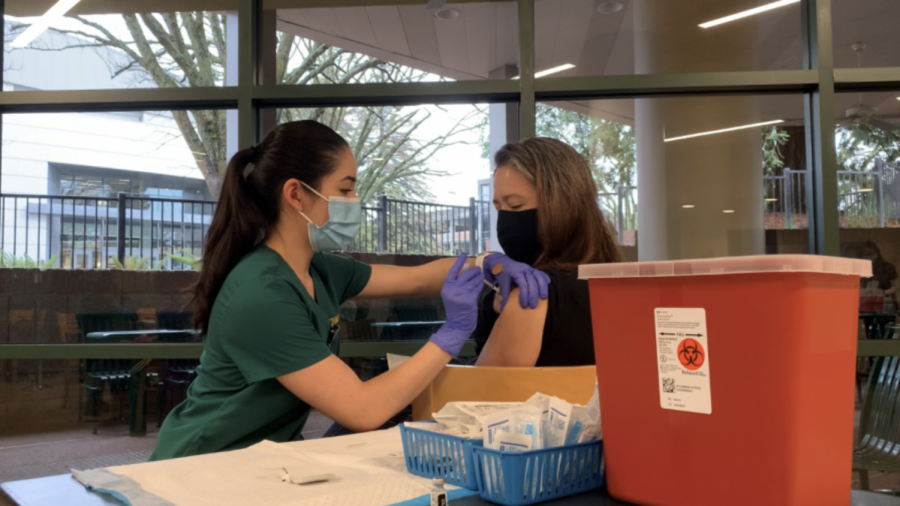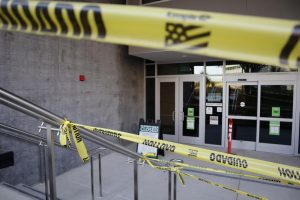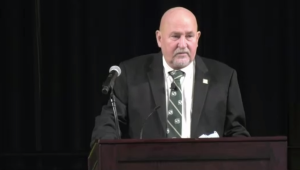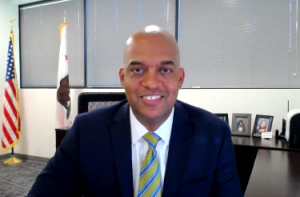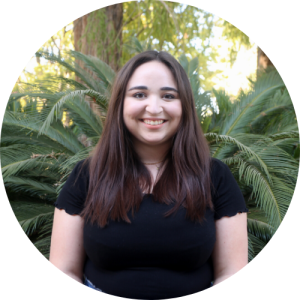FAQ: What to know about the COVID-19 vaccine mandate at Sac State
(File photo) Nursing student Carmel Stewart (right) receives her first dose of the Pfizer COVID-19 vaccine in the Brown Bag Room of the University Union on Thursday, Jan. 28, 2021. The State Hornet compiled answers to frequently asked questions about the vaccine mandate and other COVID-19 safety protocols at Sac State.
September 1, 2021
On July 27, Sacramento State and the California State University system announced that it is requiring all students, faculty and staff to be vaccinated against COVID-19 in order to be on campus in the fall.
As the semester begins, The State Hornet compiled answers to frequently asked questions about the vaccine mandate and other COVID-19 safety protocols at Sac State.
Question: Are masks required on campus?
Answer: Yes. According to President Robert Nelsen in his fall address on Aug. 25, anyone on campus will be required to wear a mask in all public spaces and may only take the mask off when eating or drinking in dining halls or when alone in a private space. This mandate will last until the pandemic is “declared over,” according to Nelsen, and applies to those visiting campus as well.
Q: Where do students certify their vaccination status? What is the deadline?
A: Students can certify their vaccination status in their Student Center and must submit their self-certification by September 13 in order to have access to campus. This item is visible on students’ To Do Lists in their Student Center.
The four options students can select when they certify are:
- They have received an approved COVID-19 vaccine, with the final dose administered at least 14 days before certification in order for them to be considered fully vaccinated.
- They qualify for a medical exemption.
- They qualify for a religious exemption.
- They do not plan to access campus or any campus programs and will revise their certification before accessing campus or a campus program. This includes any students taking only online classes.
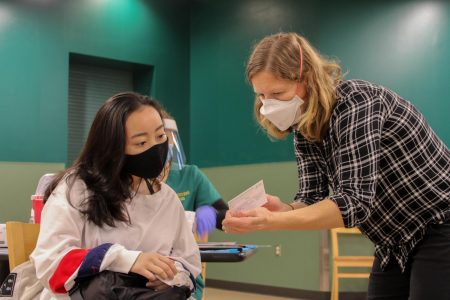
Q: Do students need to show paperwork to prove they are vaccinated on their initial certification?
A: Initially, students must provide the manufacturer of their vaccine (either Pfizer, Moderna or Johnson & Johnson) and the dates they received their dose or doses. Brian Blomster, director of news and communications at Sac State, said in an email response reviewed by administration that students are “encouraged, though not required” to include proof of their vaccination while completing the certification, which would be uploaded to the student’s health portal in Student Health and Counseling.
Students will be directed to submit supporting documentation via “To Do” items within their Student Center, according to Nelsen’s SacSend on Aug. 3.
Q: What verifications will be performed to check the validity of students’ vaccination statuses?
A: According to Blomster’s email, students will be randomly chosen to have their vaccination status reviewed and may be asked to provide proof of vaccination or any documentation supporting their approved exemption.
Q: What if a student who has been on campus fails a random check?
A: Blomster said the university will contact the student to collect documentation and that “next steps will depend on the student’s individual situation.”
Q: What qualifies as a medical or religious exemption?
A: Joy Stewart-James, associate vice president of Student Health and Counseling Services, said to “reference the CDC” for a list of medical exemptions, as the Centers for Disease Control “provides guidance for all vaccines.”
The CDC states that people who have had a “severe allergic reaction (e.g., anaphylaxis) after a previous dose or to a component of the COVID-19 vaccine” or an “immediate allergic reaction of any severity after a previous dose or known (diagnosed) allergy to a component of a COVID-19 vaccine” should not get vaccinated and should consider consulting an allergist-immunologist and receiving a vaccine alternative.
The CDC also currently says people who are sick with COVID-19 should wait to be vaccinated until they have recovered from their illness. Stewart-James said this situation “may qualify for a deferral but is not considered an exemption.”
Religious exemptions include those with “a sincerely-held religious belief, observance, or practice precludes you from receiving the COVID-19 vaccination,” according to the SacSend.
Q: How do students report to the school that they feel they qualify for an exemption, and can that exemption be denied?
A: Students can certify that they are requesting an exemption for medical reasons on the self-certification form in the Student Center and will be directed to Student Health and Counseling Services, according to Nelsen’s SacSend. They must submit documentation from a licensed healthcare professional in the ‘To Do’ section of their Student Center.
Those who are requesting a religious exemption must submit a written statement describing the reason why in the ‘To Do’ section of their Student Center. Requests will be reviewed by the Office of Equal Opportunity.
Requests for exemptions can be denied, according to the SacSend.
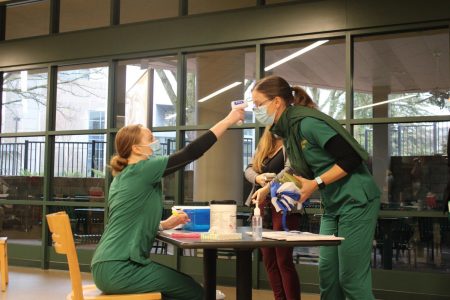
Q: What safety measures are people with an exemption required to take (for example, testing?)
A: People with exemptions will be required to be tested for COVID-19 twice a week, according to Nelsen’s SacSend on August 3. This testing will begin on Sept. 13, according to Blomster. It will take place on campus on the first floor of parking structure 3, according to Ed Mills, vice president of student affairs.
If people with exemptions fail to meet the twice-weekly testing requirement, they may be denied access to campus, according to the SacSend.
Q: What if a student tests positive during testing?
A: Someone who tests positive during the twice-weekly testing will be asked to consult with their medical provider and will be denied access to the campus until they are cleared by that medical provider, according to Nelsen in his fall address.
If a student getting tested at the health center tests positive for COVID-19, the health center will provide instruction for isolation and quarantine and will follow protocols for notifying faculty, staff and students who were in contact with the student.
Q: What if a student is not yet fully vaccinated by the deadline of September 13?
A: According to Blomster, students will be allowed to change their certification in the Student Center and regain access to campus. If students are not “able to resolve the situation” and certify their status in entirety by Sept. 27, any face-to-face classes they have will be “administratively dropped,” Blomster said, and they may incur charges from the university or be asked to repay part of any financial aid they receive.
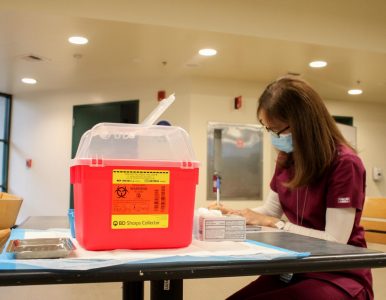
Q: What if a student does not want to be vaccinated?
A: If a student is not vaccinated and does not have an exemption, they will not be allowed on campus and professors for any face-to-face classes they are enrolled in will be notified that they are not allowed on campus.
“There is no exception for opposing or not believing in vaccinations,” Nelsen said in his fall address.
Q: Does the vaccine mandate apply to everyone on campus?
A: Yes. However, the policy is in the meet and confer process, according to Nelsen in his fall address, meaning unions and the CSU system are discussing the mandate’s application to those represented by unions.
Represented employees (not including administration) cannot currently be disciplined or denied access to campus for not attesting to their vaccination status by the deadline and no represented employee with an exemption can be required to undergo regular testing. Not until the meet and confer process has been completed can these consequences go into effect for represented employees.
Q: Are vaccines still offered on campus?
A: Yes. Sac State offers the two-shot Pfizer vaccine series and the one-shot Johnson & Johnson vaccine. Appointments can be made here for Wedesdays and Fridays between 8:30 a.m. and 3 p.m. at the Terrace Suite of The WELL.
Q: Are COVID tests offered on campus for those without exemptions?
A: Yes. Symptomatic individuals can get a free COVID test in the student health center. Additionally, free at-home COVID test kits will be available sometime after Sept. 13 when the testing clinic for exempt individuals is implemented, according to Stewart-James.
Q: How will the vaccine and mask mandates on campus be enforced to ensure the safety of the campus?
A: “Students who violate campus policy or the Student Code of Conduct (e.g. falsifying a vaccine record) will be subject to disciplinary actions,” Blomster wrote in his email. “Discipline can range from educational sanctions to suspension (or even expulsion in extreme cases).”
If a student refuses to wear a mask in class, Provost and Vice President of Academic Affairs Steve Perez said a professor should request that they leave, and if the student refuses to leave, Perez recommends that the professor end the class session and report the situation to student conduct.
Q: Does the vaccine mandate apply to people visiting campus for sporting events or other gatherings?
A: Visitors will not be required to certify their vaccination status and there is no current plan to do so, according to Nelsen. However, the mask mandate applies to anyone on campus, regardless of if they are a student, employee, faculty member, administration official or visitor.
Q: Are there any physical distancing requirements in classrooms?
A: No, according to Perez.






























































































































